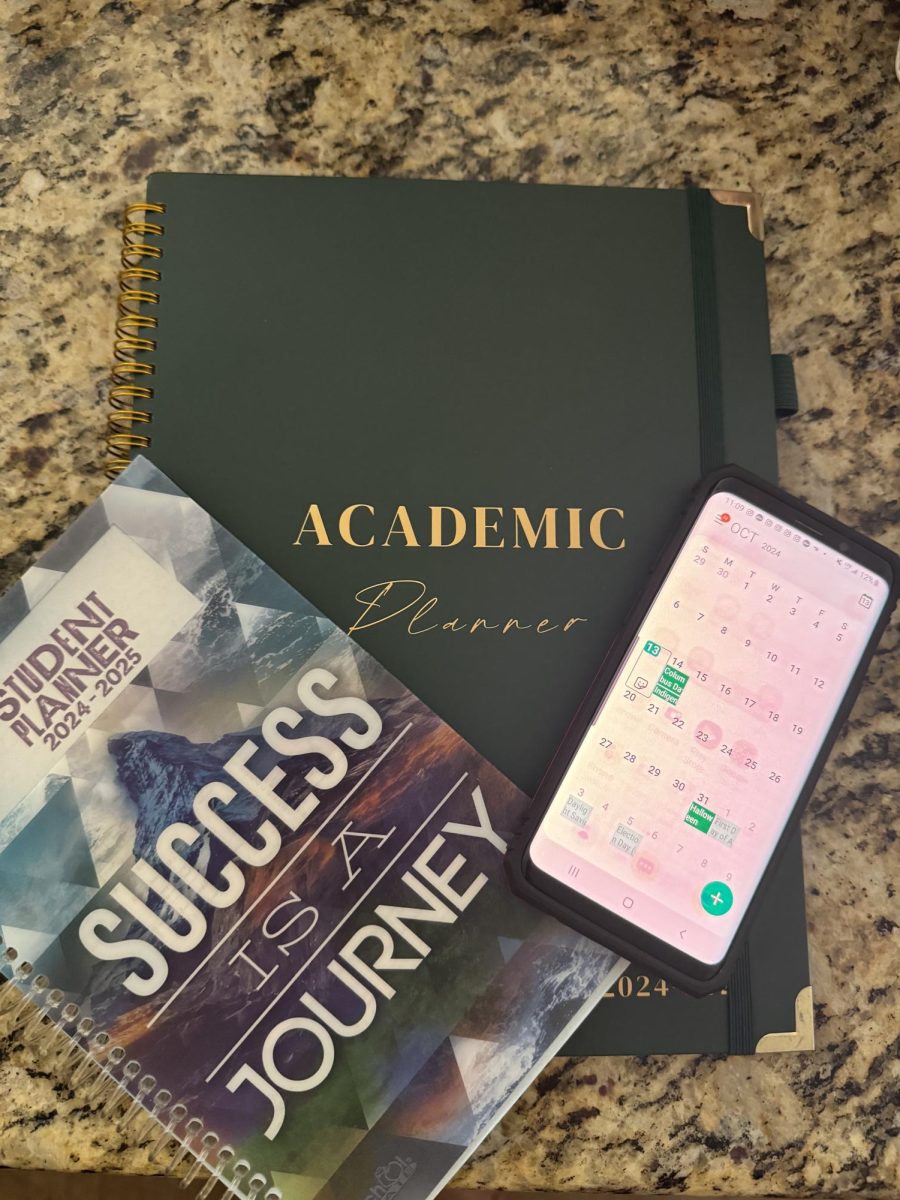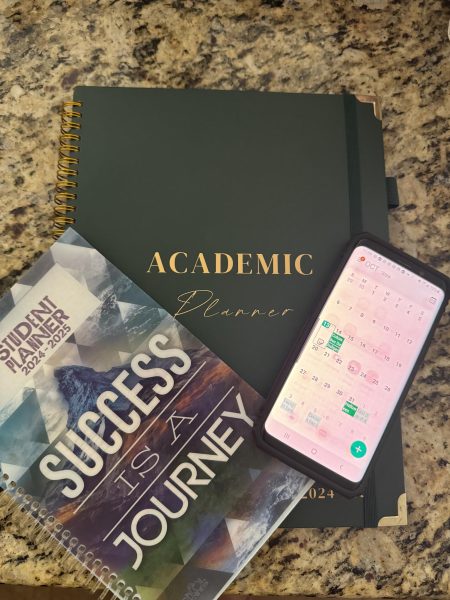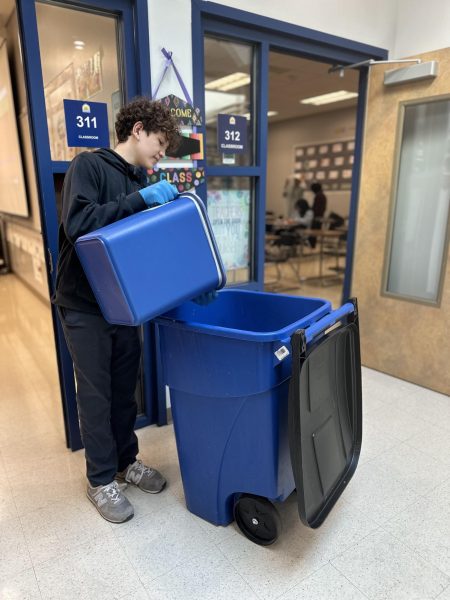
Wahaj Uddin
Using a planner, or even the calendar app on your phone can allow you to manage your time more effectively, and avoid loosing track of tasks.
As the first quarter of the school year nears the end of its first half, there really isn’t a better time than now to reflect on how the school year has been going. Moreover, now’s the perfect time to make a plan on how you will tackle the rest of the school year. So with that being said, how does one achieve the two aforementioned goals? Well, let’s start with the first goal, reflecting how the school year has been going so far. To answer this question, you must consider 3 aspects of your school life: academics, extracurricular activities, and social life. Academics refers to your grades, GPA, coursework, etc. Since this aspect of your school life is heavily numerical, it isn’t too difficult to judge, but there are a few things to consider.
First, consider your academic performance in all of your classes. Open your sycamore account, browse through your grades, and just see how well you’re doing. Are you performing to your expectations? Are you pleased with where you stand? Were you organized? Next, consider each of your class grades individually. Are there certain classes that you’re struggling with? Are there certain classes that you thought you would have done better in? Lastly, if there are any classes that you’re struggling with, consider the individual grades that culminated in your average. Was there a test or project that lowered your grade? Did you have any missing assignments in that class? If your grade was low, was it because of homework, classwork, or something else? By asking yourself these questions, you’re actively reflecting. If you notice that your grades are a little below your expectations, then try to understand why. If you did well in all of your classes, except one AP class that you really struggled with, try to understand why. Was it because you didn’t understand the content and you did badly on the tests? Was it because you were disruptive in class and got low participation grades? Or was it because you didn’t focus on the homework or classwork for that class? Once you’ve answered these questions, you should have a reasonable understanding of why you academically performed the way you did in quarter one.
Once you’ve understood everything mentioned above, now you can think about how you can improve academically for the rest of the year. The idea here should be for you to make a solid plan. As students, we’re all hung up in different things in our lives besides academics, and so sometimes it can be easy to forget about grades, which is why having a good plan is so important. If you’re struggling in Math for example, and you notice it’s because you forget to do homework and you don’t understand the content, then make a plan to fix that. Regarding homework, start using a planner or set reminders on your phone so you don’t forget about it. If you don’t understand the content, try focusing more in class and asking more questions, or consider asking teachers for help one on one. You can also watch videos on YouTube to help supplement your learning. Ms. Jaena Holcombe, a high-school English teacher, shares her thoughts regarding students struggling with certain subjects: “Make a list of little things you need to improve. For example, [if you struggle] in math, give yourself some extra time each day to study. If you’re struggling with an AP class, learn strategies to find ways to study and work efficiently.”
Ahmed Osman, a sophomore student at BHA, emphasizes that time-management is the key to academic success. “You need to manage your work on priority and difficulty. For example, if you have a project, break it up into bits of work. I would also say finish immediate work first, and prioritize AP.”

The next thing you should be reflecting on regarding the first quarter should be your extracurricular activities. These include your clubs, sports, competitions, volunteering, etc. Speaking from experience, extracurriculars are often heavily underrated, when in reality they are crucial. Your extracurriculars are what make you stand out among other students, because it’s really common to see students with similar grades, especially nowadays. So ask yourself, how committed was I to extracurriculars? Did I enjoy certain activities over others? These 2 questions are critical revealers of how good your extracurriculars are, and how worth it they are.
For example, if you just joined STUCO at the start of the year because all of your friends joined it, or NHS, but you never really felt committed to the purpose of the club, and you just dreaded going to their club meetings and you thought of them as a waste of your time, well that says something. If that’s how you feel about a certain club, it means that you should probably drop out of it. What people often don’t understand is that the only extracurriculars that are worth it, are those that you genuinely care about. The reason for this, is that there is no one to force you to make progress on extracurriculars. Regarding your grades, your parents, or fear of failure could be forces that are pushing you to keep going. But those forces don’t exist with extracurriculars. The only thing that will motivate you to make progress with them is you. If you enjoy an activity, and care about it, you will make progress on it even without any deadlines or pressure. Otherwise, you most likely won’t. So dedicate your time to things you actually enjoy and care about.

The last thing you want to be considering at this point is your social life. Now this might seem a little weird, since when do BHA high-school students have a “social life”. Well believe it or not, all students have a social life. Our interactions with friends, family, teachers, and classmates all fall into this category. The reason why this is so important is that making it through school is a team effort. You see, this is a key thing that people often don’t realize. There are many high-school students who probably believe that only they can be of use to themselves in school, which is a determined mindset, but is only true to a certain extent. School is a team effort. It begins with your teachers. They teach you knowledge and information. Then you study and learn. Along the way however, your friends and parents and classmates support you, and help you whenever you’re in need. Take out any part of this 3 way system, and the whole thing collapses. Obviously you need to be working hard, but you also need your teachers, friends, parents, and classmates to support you. So ask yourself, do I have good friends? Can I count on my peers to support me? If the answer to these questions is yes, then congratulations, you’ve performed one of the most important actions to set yourself up for success not only in school, but later in life. If the answer is no, then take it seriously, but don’t be scared. Find people who will not only accept who you are, but help you become who you want to be.
However while reflecting on all of these things, it’s crucial that students don’t get too hard on themselves, decide to harm their health to improve their academic performance, or give up. Ms.Holcombe remarks, “Don’t be so hard on yourself, and have confidence”. Moreover, Osman emphasizes the importance of getting a good night’s rest: “Prioritize your sleep, get those 8 hours”.
Osman also emphasizes that “there are 3 quarters left in the school year”, and that one shouldn’t give up based on how they did in this first quarter. “Your previous failures do not determine future success”, he remarks.
So as we move into the second quarter of the school year, it is more important now than ever before to be organized, have a plan, and reflect on the past. Having these skills won’t just allow you to make the most of your school year, they will allow you to make the most of your life.